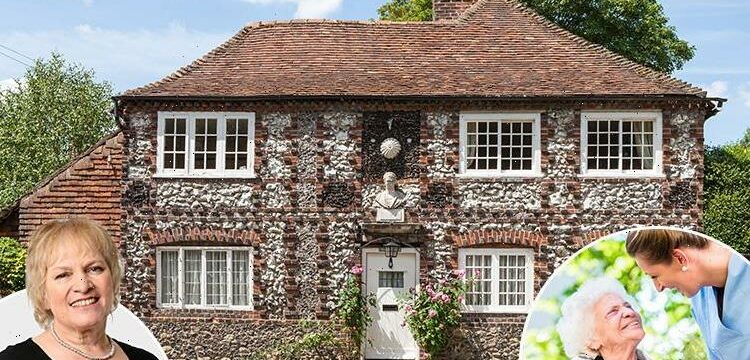NO manifesto has everything you want.
No government delivers it and even the most “core” voter can be set wobbling with indignation.
But sometimes a risky pledge is a good one and it is decent to put it up front.
I feel this way about Theresa May’s plan to take a bigger contribution from people who receive state-funded care at home in their final years.
The idea is to admit that, whether you stay put or move to a care home, it will now be considered that your means-tested wealth includes your house.
Only the last £100,000 of the total gets protected for your heirs.
Nobody, and no surviving partner, would have to sell that house in their lifetime.
But after death the state would do so, to repay the cost of publicly provided care.
The protected £100,000 inheritance is four times as much as under present rules, but the clinching difference is that now the house’s value will be counted as if it were cash.
It’s a bold move and tweaks and explanations are needed — Mrs May admitted as much yesterday, proposing an “absolute limit” on the amount anyone will have to pay. But it is a necessary move.
Those shouting “dementia tax” — often Conservative candidates in a panic — are closing their eyes to two things.
One is the reality of an ageing population.
The other is that the present low, underpaid standard of home care simply will not do.
Nor can I sympathise with dementia charities which, unforgivably, in their propaganda try to set sufferers against one another by complaining that if you were in hospital with cancer your care is free on the NHS, but if you are at home with dementia needing social care you have to contribute.
The bald and boring fact is that looking after people who are growing weaker requires new money: A lot.
Home care needs to be far better, less rushed and delivered by workers with higher status and on higher pay. This would be more justly funded by the accumulated wealth of elderly individuals than the tax bills of younger families.
As for the “right” of children to inherit, the protected £100,000 is not a flea bite but a good deposit or mortgage pay-off.
MOST READ IN OPINION
THE SUN SAYS Angel Lynn kidnapper's derisory sentence is a mockery of justice
This is what our PM must do to fix Brexit Britain… whoever they are
Not much upstairs and a right mess downstairs (not Katie Price, her house)
We must never forget the Holocaust and make sure it never happens again
Cries of “unfair!” and “postcode lottery!” are naturally provoked by the absurd and damaging level of house prices in the prosperous cities and the south.
Someone owning a million-pound house will end up posthumously “paying” more to be looked after than someone in a two-bedroom flat in Hartlepool.
But when the Prime Minister was asked: “Why is that fair?” she rather splendidly replied: “Because it is!”
As for the perennial moan of “we paid tax all our lives, so look after us for free for as long as we need it”, that doesn’t wash.
Yes, we all paid taxes (National Insurance is a tax, stop pretending!) But it wasn’t just for care.
We got the NHS, education, roads, parks, police, Armed Forces, child benefit, pensions, social decency and care for the truly vulnerable.
Most of us do all right from the bargain.
If we grow old and frail with more than £100,000 in our name, we can afford to help with the cost of that old age.
Of course, the absurd level of house prices is partly what makes this move feel toxic to some. That inflation is unquestionably a Bad Thing, the fault of successive governments.
They didn’t predict population levels or use council house sell-off proceeds to build more.
They smilingly tolerated foreign buy-to-leave investors using the capital as a piggy bank for dodgy money, and allowed pathetic savings interest rates to fuel an exploitative buy-to-let boom.
Homes are now disgustingly overvalued as pieces of wealth, while being undervalued as practical necessities.
Adult children, fretful about their own chances, gaze at the parental home with thoughtfully greedy eyes.
That is where we are, though.
If an old person needs home care — let me speak, I’ll be one sooner than many who read this — then for heaven’s sake, let the damn house contribute.
For my generation it is a piece of accidental, unearned bunce anyway: We just wanted somewhere to live and had no idea it would become a money box.
Since nobody plans to turn us out while we are still breathing, there may even be some satisfaction in knowing that we are not needy petitioners for welfare but clients demanding a high standard of care because it is paid for by our very home.
Still the cry from the affluent middles: “A tax on inheritance!” So what? Why the hell should poorer people’s taxes pay for your old mum’s care, just so you can inherit an unencumbered house instead of making do with £100,000? OK, maybe you are sentimental about the house itself.
If so, then cut back, live more frugally and pay for the oldies’ social care yourself. Or bite the bullet and let Ye Olde Rectory keep them safe.
Perhaps the most telling absurdity is the hypothetical example circulating of two families with identical houses.
In one the surviving parent has a heart attack and the offspring inherit the lot.
Next door’s oldster lingers on for a decade needing care from the state, so their kids get only £100,000-worth. “So unfair!” they cry.
Indeed. Life is unfair. And if you are wistfully hoping your parents drop dead quickly to make you richer, you don’t deserve anything.
Source: Read Full Article













